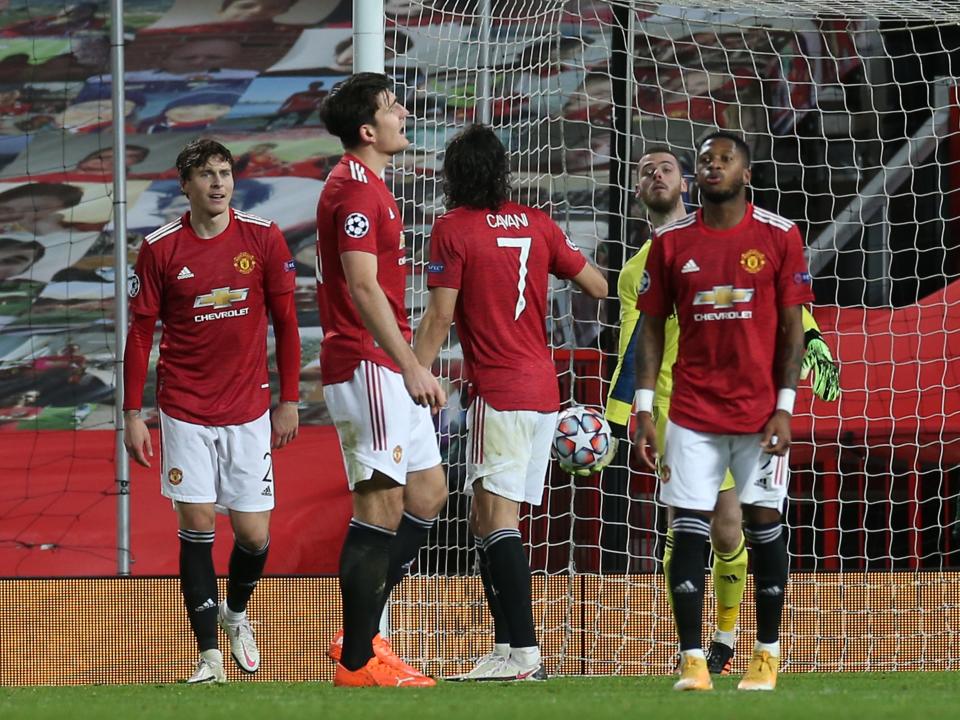Manchester United will have only themselves to blame if they are knocked out of the Champions League

There is little room for error at this rarefied level and Wednesday night’s 3-1 defeat to Paris Saint-Germain is a timely reminder of that fact for Manchester United and Ole Gunnar Solskjaer, just in case they need it.
You would hope that they don’t, but then again, this second defeat of their Champions League campaign included their second instance of a basic, avoidable error which scuppered their game plan and surrendered all their hard work.
A month ago, having taken six points from two games against their main challengers for a place in the knockout stages, United were undone by a moment of pure amateurism: failing to keep a single player back as defensive cover on an attacking corner in the 13th minute.
Allowing Demba Ba to establish a lead for Istanbul Basaksehir that was never relinquished in that 2-1 defeat away in Turkey is the reason why United still needed a point from their penultimate game on Wednesday night to secure last-16 qualification.
And now, Solskjaer’s decision not to substitute Fred before his 70th-minute sending off against Paris stands as yet another fundamental and easily avoidable mistake. It is partly why they will travel to Leipzig still looking for that point.
Sacrificing Fred was the obvious course of action from the moment he escaped a straight red card for headbutting Leandro Paredes, instead only seeing yellow. It was only more necessary at half-time, shortly after he had narrowly avoided another yellow for a challenge on Paredes again.
It is not as if Solskjaer was limited in his number of substitutions – with five available in the Champions League – or as if adequate replacements were not on hand. Paul Pogba’s fitness may have been in question after only recently recovering from an ankle issue but Nemanja Matic is a natural defensive midfielder while Donny van de Beek has deputised well in a similar role of late.
Removing Fred and introducing either Matic or Van de Beek at half-time would have been the sensible move. Instead, Fred was the first out of the tunnel when United re-emerged and remained on the pitch until suddenly – after one challenge on former team-mate Ander Herrera – he didn’t.
To his credit, Solskjaer was quick to answer the inevitable questions about his game management which followed in his round of post-match interviews. He defended his decision to persevere with Fred and explained his thought process, albeit while gently admitting that he had considered a substitution and he could have done things differently.
“There was no reason from his performance to take him off,” Solskjaer said. “I thought Fred kept his head and cool exceptionally well in the second half and was unlucky with that decision by the referee. You can say in hindsight to have 11 men of course that would have been better, but who’s to say?
“We spoke to him at half time and just said be sensible and I thought he was, I thought he played really well and was very sensible in the second half,” the United manager added. “He played well but with the decision the referee made, you maybe look back and say you should have [taken him off].”
Another key plank of Solskjaer’s defence was that Fred’s second yellow for a tackle on Ander Herrera was soft. Replays suggest he had a point. And in fairness – given the dismissal came with the scoreline at 2-1, moments after Marquinhos’ goal – there is every chance that United might have fallen to defeat with 11 players on the pitch regardless.
Yet even if the second yellow was contentious, you lose any leeway you have to make the type of challenge which Fred made when you have already been cautioned for headbutting somebody. And though it is true United had just fallen behind, the red card immediately killed off any realistic hope of a comeback with much of the second half remaining.
Management is about making decisions and making decisions often involves weighing up risks. Some risks, like when deciding how long to persist with a player who is on a booking and walking a tightrope, are more difficult to gauge than others – like when choosing whether to send every player forward for a 13th-minute corner.
This error was not as egregious as the one in Istanbul. Then again, that is not saying much. Both are basic mistakes that can and usually will be punished at any respectable level, certainly in the Champions League. United are guilty of committing both in a group stage campaign that has otherwise been quietly impressive, one that should already have secured qualification.
For all the positives of the opening round win in Paris, for all the optimism generated by the emphatic 5-0 victory over Leipzig, a failure to do the basics right has allowed both of their Group H rivals to make up for lost ground and has left United’s fate in the balance with one game remaining. If they do not take the point they need, they will only have themselves to blame.
Read More

 Yahoo Finance
Yahoo Finance 